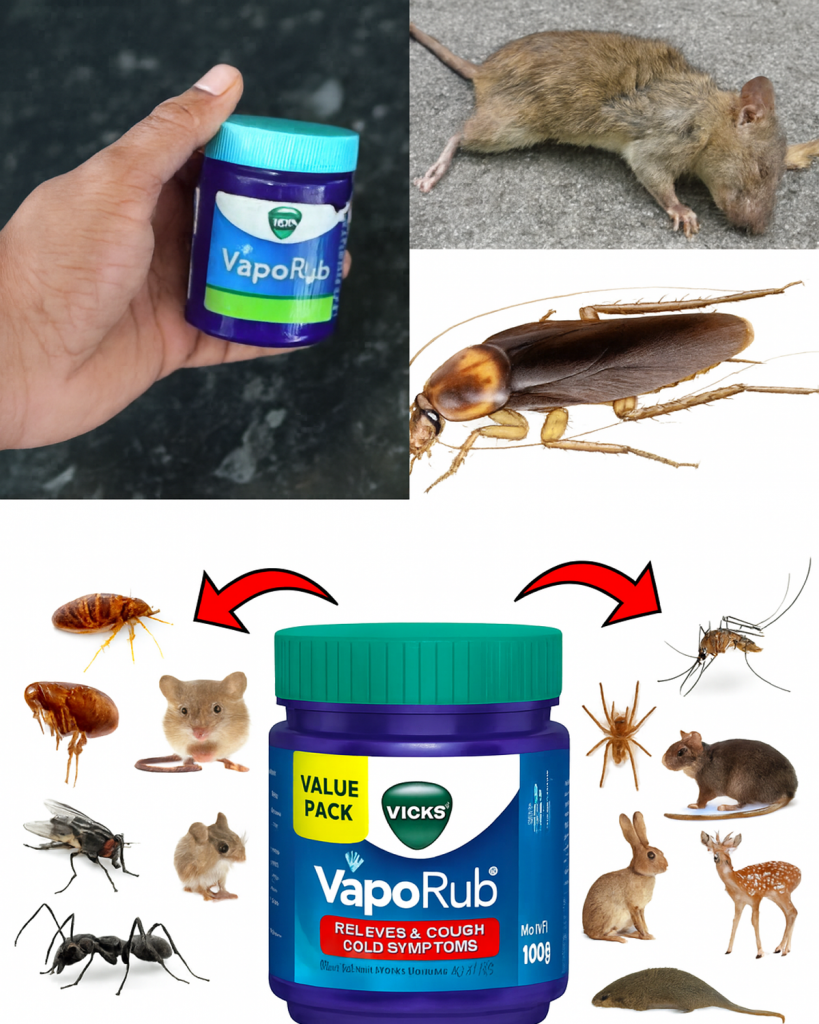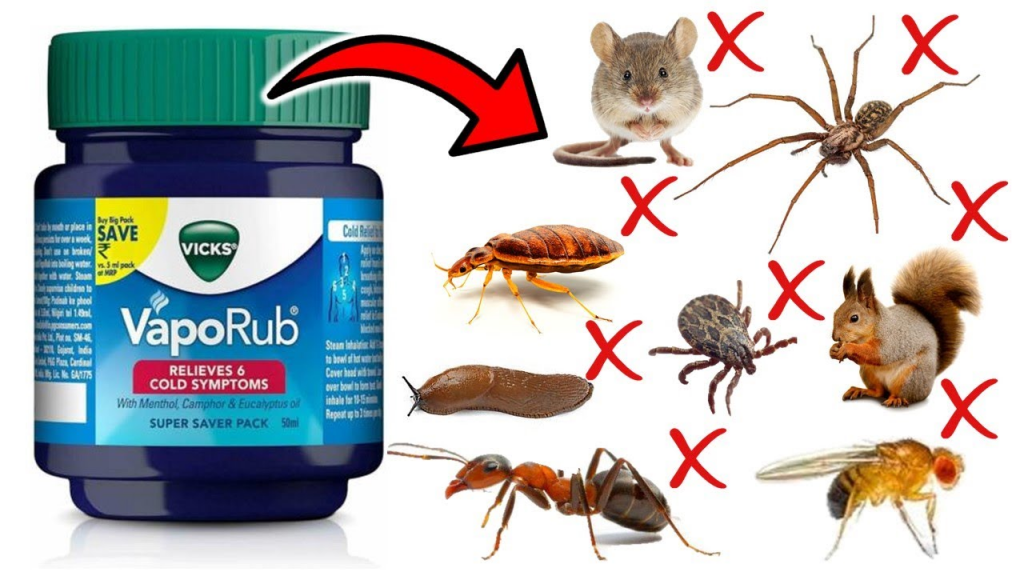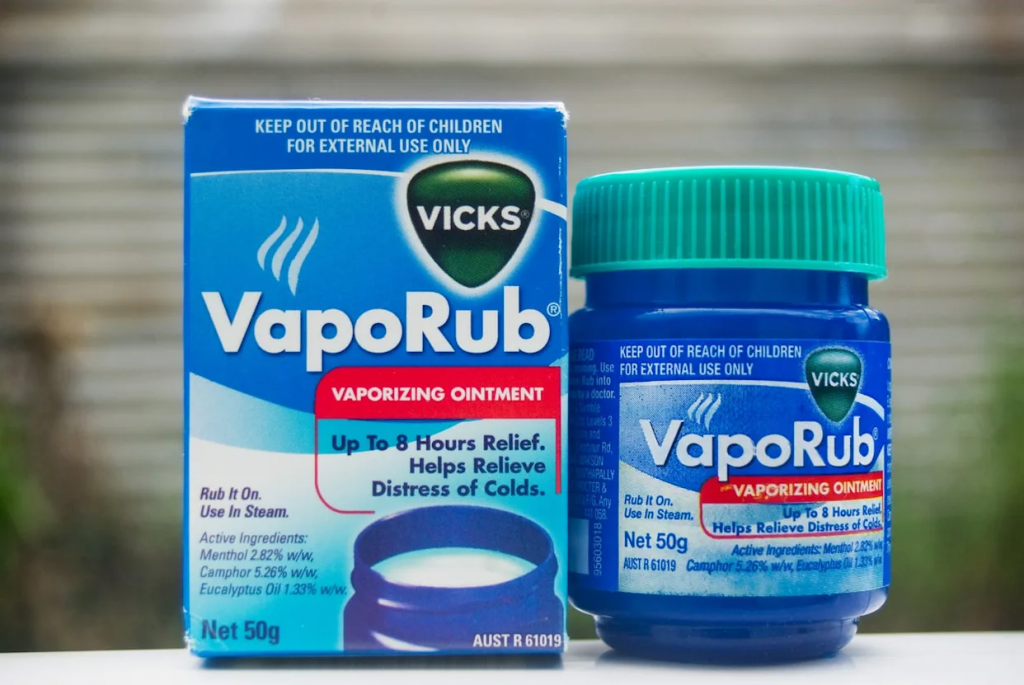Did you know that the little blue jar sitting in your medicine cabinet might do more than ease coughs and congestion? For decades, families have relied on Vicks VapoRub to soothe colds, but many have discovered an unexpected use: keeping pests away. Imagine a natural, budget-friendly alternative that helps deter mosquitoes, ants, cockroaches, and even rodents. With billions spent every year on pest control, it’s no wonder people are turning to creative home remedies.
This article explores how Vicks VapoRub can serve as a surprising hack for pest removal. Whether you’re tired of mosquitoes ruining your evenings, ants invading your kitchen, or flies buzzing around, this simple household staple might offer some relief. We’ll cover the science behind why it works, practical ways to use it, and real-life tips that families have shared. By the end, you’ll have a handful of strategies you can try right at home.

Why Vicks VapoRub Can Repel Pests
Vicks VapoRub is made from ingredients with strong aromas that many pests find unpleasant. Its main components include:
- Camphor: Known for its pungent smell, it can confuse insects’ senses.
- Menthol: A cooling compound with a sharp scent that many bugs avoid.
- Eucalyptus oil: Long recognized as a natural insect deterrent.
- Petroleum jelly: Helps the scent last longer by slowing evaporation.
The strong combination of these ingredients is not harmful to humans when used externally as directed, but it can overwhelm the delicate sensory systems of insects and small rodents.
How to Use Vicks Against Common Pests
1. Mosquitoes
Apply a thin layer of Vicks VapoRub to exposed areas of your skin, such as ankles or wrists, before going outdoors. The menthol and camphor scent helps mask the human odors that attract mosquitoes. Some people also place an open jar of Vicks on a bedside table to keep mosquitoes away during the night.
2. Ants
Ants rely on scent trails to navigate. Spread a small amount of Vicks along entry points like window sills, cracks, or baseboards. The smell disrupts their trail, discouraging further entry.
3. Flies
Flies dislike the smell of eucalyptus and menthol. To keep them at bay, dab Vicks on a cotton ball and place it near fruit bowls, trash bins, or windowsills.

4. Spiders
While spiders are not technically insects, many avoid strong, unfamiliar scents. Apply a thin layer of Vicks in corners, under furniture, or near door frames to discourage them from nesting.
5. Rodents
Small rodents have sensitive noses. Placing Vicks on cotton balls and setting them in cupboards, under sinks, or in garages can make these areas less appealing.
6. Cockroaches
Cockroaches are notoriously resilient, but even they tend to avoid the smell of menthol and camphor. Dab Vicks near cracks or under appliances where roaches typically hide.
7. Gnats
Gnats swarm around decaying fruit or damp areas. Set out a cotton ball dabbed with Vicks near houseplants or kitchen counters to deter them.
| Pest | Application Method | Where to Use |
|---|---|---|
| Mosquitoes | Apply on skin or place open jar | Outdoors, bedside |
| Ants | Spread along entry points | Baseboards, windows |
| Flies | Dab on cotton balls | Near fruit, trash bins |
| Spiders | Thin layer in corners | Walls, furniture edges |
| Rodents | Vicks on cotton balls | Cupboards, garages |
| Cockroaches | Dab in hiding spots | Appliances, cracks |
| Gnats | Cotton balls with Vicks | Near plants, counters |

Real-Life Tips and Experiences
Many homeowners have shared positive experiences online. For instance, one mother reported fewer mosquito bites after rubbing Vicks on her kids’ ankles during summer camping trips. Another family placed cotton balls with Vicks in their pantry and noticed ants stopped raiding their sugar jar. While results vary, these anecdotes highlight the practical side of this unconventional hack.
Additional Benefits of Using Vicks at Home
Beyond pest control, Vicks VapoRub offers multipurpose household benefits:
- Helps ease minor muscle aches when massaged into sore areas.
- Provides a cooling sensation for headaches when applied to the temples.
- Creates a soothing aroma for relaxation when placed in a bowl of hot water as steam.
These uses make it a versatile product to always keep on hand.

Safety Considerations
- Use externally only; never ingest Vicks VapoRub.
- Avoid applying on broken skin or directly under the nose, especially in children.
- Keep out of reach of pets and young kids, as ingestion can be harmful.
- For pest control, use small amounts—its strong aroma is potent enough without over-application.
Conclusion
Vicks VapoRub may not replace professional pest control, but it offers a simple, cost-effective hack for everyday situations. Its natural ingredients like menthol, camphor, and eucalyptus oil make it unappealing to many common household pests. By strategically applying it in your home, you may reduce nuisances like mosquitoes, ants, or cockroaches without harsh chemicals.
FAQ Snapshot
- Does Vicks permanently get rid of pests? No, it only repels them temporarily.
- Can I use it on pets? No, Vicks is not safe for animals and should not be applied to their skin or fur.
- Is it safe for kids? It can be used externally on children over 2 years old, but avoid under the nose and use sparingly.
Disclaimer: This article is for informational purposes only. It does not replace professional pest control or medical advice. Always consult experts for persistent pest problems or health concerns.




